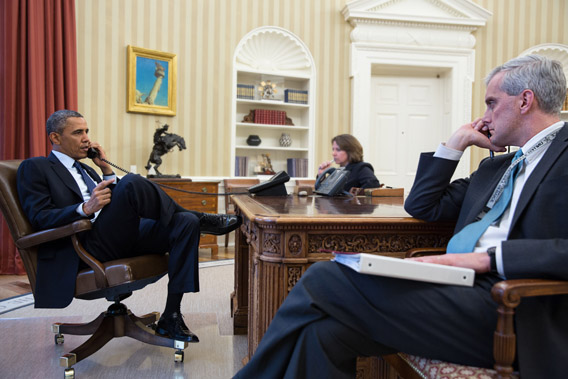
President Obama (L) in the oval office with Chief of Staff Denis McDonough (R). Is the administration choosing the right things to show seriousness about?
Photo by Pete Souza/The White House via Getty Images
When White House Chief of Staff Denis McDonough told his colleagues last week to spend no more than 10 percent of their time responding to scandals, he didn?t know a tornado would devastate entire stretches of Oklahoma. He knew something like it would happen though. A chief of staff knows that White House plans are always being upset, so he reminds his staff: Don?t get too distracted, bigger distractions are always on the horizon.
The destruction in Oklahoma brings perspective to the debate about what a president should do and when. For the last several weeks, the president?s critics have been trying to get him to react to crises both real and imagined. With the Oklahoma disaster, the answer is obvious about what a president and his staff should do: all hands on deck. But how do you focus a White House when there is no clarifying event? That?s what Denis McDonough was trying to do.
All presidencies try to minimize the distractions. When George W. Bush came into office, his aides talked about how he would be an ?A4 president,? meaning that is how deep you would have to page through the newspaper to read about him. He wouldn?t feel compelled to participate in every story that news editors decided was worthy of the front page. His administration would stay focused on the important things.
Every administration has an abstract hierarchy of priorities it tries to follow. In a world of limited resources, limited presidential time, and inevitable distractions, staff follow this general pecking order: emergencies, duty, vision, press demands, and partisan criticisms. Forces from each of these groups will try to change this order, but a successful White House keeps their eyes on the prize.
This is all fine and good, but as the Bush administration learned and every administration learns, it?s hard to sustain. The press and partisan critics can make those lower priorities inch up, especially if a White House is inattentive or unprepared.
Right now there is a debate over whether the Obama White House has its priorities straight. Critics say items the president should be treating as part of his duty or as an emergency, like the attack on the U.S. consulate in Libya, are being blown off as a lesser-order nuisance. The president called the Benghazi talking points a ?sideshow.? White House senior adviser Dan Pfeiffer said much of the recent controversy?from questions about the response to the Benghazi attack to the IRS targeting of conservative groups?was the result of a Republican witch hunt.
The president?s critics see these responses as a part of a cover-up, but there is a difference between priorities and cover-ups. For example, on the issue of Benghazi, those who argued that evidence of a White House cover-up could be found in the talking points prepared last September after the attack lost a lot of ground last week when the emails related to the talking points were made public. But those same critics were right to be offended by the president?s claim that the questions about the talking points were not a priority. They weren?t a ?sideshow,? as Obama claimed. Those talking points constituted the administration?s first complete public response to the death of four citizens who were carrying out the president?s policy.
So the Obama team was wrong about the priority of the issue, but right about the lack of evidence of a cover-up. The IRS scandal is also a battle between priorities and allegations of a cover-up. At the moment, there is no evidence of a White House cover-up, or even involvement for that matter. Investigators will keep digging. The most important question: Who initiated the extra attention the IRS gave to conservatives? The IRS says it was a natural response to the increase in applications after the Citizens United case. But there was no such uptick.
As a matter of priorities, when the IRS matter came to light, the president faced criticism that he was out of touch with the activities of his own administration. Press Secretary Jay Carney said the president had learned about it?like the rest of us?from news reports. Though members of the White House staff had known about the IRS inspector general?s report detailing the abuses for a month, Carney says they never told the president for legal reasons.
The White House reaction to the IRS scandal offers a classic test of the McDonough formula. The president has no control over the IRS. (In fact, it would be a crime if he did.) So calls for him to act like an action hero and storm into the IRS to clean house are illogical, especially before the official inspector general?s report was published.
Source: http://feeds.slate.com/click.phdo?i=24d450fc07e0201b60a70e8a3b07a6af
russell westbrook NFL Draft Grades 2013 living social pnc Pain and Gain Eddie Lacy Justin Pugh
No comments:
Post a Comment
Note: Only a member of this blog may post a comment.